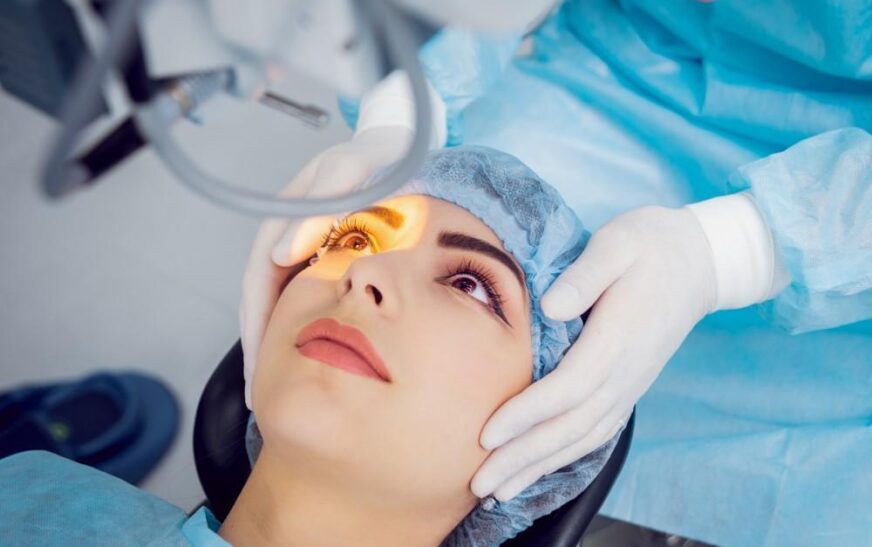Refractive eye surgery is a groundbreaking solution for those seeking to eliminate their dependence on glasses or contact lenses. Whether you’re tired of dealing with blurred vision, constantly searching for your glasses, or simply want to improve your quality of life, refractive surgery might be the right option for you. In this post, we’ll explore what refractive eye surgery entails, the different types of procedures available, and how to choose the best refractive eye surgery in Gurgaon to achieve clearer vision.
What is Refractive Eye Surgery?
Refractive eye surgery is designed to correct common vision problems such as nearsightedness (myopia), farsightedness (hyperopia), and astigmatism. The goal of these surgeries is to reshape the cornea—the clear front surface of the eye—so that light entering the eye is properly focused onto the retina, resulting in clearer vision.
For individuals who are frustrated with wearing corrective eyewear, refractive surgeries offer a permanent solution that can reduce or completely eliminate the need for glasses or contact lenses.
Types of Refractive Eye Surgery
There are several types of refractive eye surgery, each designed to correct different types of vision problems. Let’s look at the most popular options:
1. LASIK (Laser-Assisted in Situ Keratomileusis)
LASIK is one of the most common refractive surgeries. In this procedure, a surgeon uses a laser to create a thin flap in the cornea, which is then lifted to allow for reshaping of the underlying tissue. The flap is repositioned, and the cornea heals naturally. LASIK is known for its fast recovery time and high success rate.
2. SMILE (Small Incision Lenticule Extraction)
SMILE is a newer, minimally invasive procedure that does not involve creating a corneal flap. Instead, a small incision is made in the cornea to remove a tiny piece of tissue, reshaping the cornea. SMILE is particularly ideal for those with dry eye issues or who prefer a less invasive surgery compared to LASIK.
3. PRK (Photorefractive Keratectomy)
PRK is an alternative for people who may not be suitable candidates for LASIK, such as those with thin corneas. In this procedure, the outer layer of the cornea is removed before the underlying tissue is reshaped with a laser. PRK requires a longer recovery time but can yield excellent results.
4. ICL (Implantable Collamer Lens)
For those who are not suitable candidates for LASIK or other laser-based procedures, ICL is an excellent alternative. A small, biocompatible lens is implanted inside the eye to correct refractive errors. ICL offers significant advantages for patients with high prescriptions.
Choosing the Best Refractive Eye Surgery in Gurgaon
When choosing the best refractive eye surgery in Gurgaon, it’s crucial to consider several factors. Gurgaon has become a leading destination for advanced eye care, home to world-class eye hospitals and experienced surgeons specializing in refractive surgeries. However, it’s essential to select a clinic or hospital that offers the right procedure for your unique needs.
Key Factors to Consider:
- Experienced Surgeons: Look for ophthalmologists who have performed hundreds or thousands of procedures with a high success rate.
- Technology & Equipment: Cutting-edge technology, such as femtosecond lasers and wavefront-guided treatments, ensures precision and minimizes risks.
- Personalized Consultation: A thorough consultation and eye examination are critical to determining which surgery will work best for you.
- Reputation and Reviews: Research patient reviews and testimonials to gauge the quality of care and results from previous patients.
For those seeking the best refractive eye surgery in Gurgaon, a highly regarded option is Indira Gandhi Eye Hospital, which offers advanced corneal and refractive surgeries using the latest technology and techniques.
What to Expect Before, During, and After Refractive Eye Surgery
Before the Surgery:
A comprehensive eye exam will be conducted to assess your overall eye health, determine the severity of your refractive error, and ensure you’re a good candidate for surgery. You’ll also discuss your expectations and choose the procedure that’s best for you.
During the Surgery:
Refractive surgery is typically done on an outpatient basis and takes only about 15-30 minutes per eye. You may be given a mild sedative and numbing eye drops to ensure comfort during the procedure.
After the Surgery:
Recovery times vary based on the procedure, but most people experience improved vision within a day or two. Follow-up visits are scheduled to monitor progress and ensure that the eyes heal properly. It’s essential to follow the aftercare instructions to minimize the risk of complications.
Benefits of Refractive Eye Surgery
- Permanent Vision Correction: Most patients achieve long-lasting results and may no longer need glasses or contacts.
- Improved Quality of Life: Enjoy greater freedom in your daily activities, whether it’s playing sports, driving, or simply waking up to clear vision.
- Minimal Downtime: Many people return to their normal routine within a day or two, especially after procedures like LASIK or SMILE.
FAQ: Common Questions About Refractive Eye Surgery
1. Is refractive eye surgery safe?
Yes, refractive eye surgery is considered very safe. With advancements in laser technology and skilled surgeons, the risk of complications is minimal. Always choose an experienced ophthalmologist and ensure the clinic uses state-of-the-art equipment.
2. How soon will I see results after surgery?
Most patients experience clearer vision within a few hours to a day after LASIK or SMILE. For PRK, recovery can take a bit longer—up to a few weeks—but the results are also highly effective.
3. Who is a good candidate for refractive surgery?
Good candidates are typically over 18 years of age, have stable vision for at least a year, and have no significant eye health issues (like cataracts or severe dry eye). Your eye surgeon will evaluate your suitability for surgery during a consultation.
4. Does refractive surgery hurt?
No, refractive eye surgery is not painful. Numbing eye drops are used during the procedure to ensure comfort. Afterward, some mild discomfort or dryness may occur, but this usually subsides within a few days.
5. Can I have refractive surgery if I have astigmatism?
Yes, refractive surgeries such as LASIK, SMILE, and PRK can correct astigmatism, along with nearsightedness and farsightedness. Your surgeon will determine which procedure is best suited for your astigmatism.
6. Are there risks or side effects?
As with any surgery, there are risks, including dry eyes, glare, or under-correction. However, these risks are rare and often temporary. Your surgeon will discuss all potential risks during your consultation.
Conclusion
Refractive eye surgery is an effective solution for those looking to improve their vision and reduce or eliminate their dependence on corrective eyewear. If you’re considering surgery, choosing a reputable clinic with experienced surgeons and advanced technology is crucial to achieving the best possible results.





